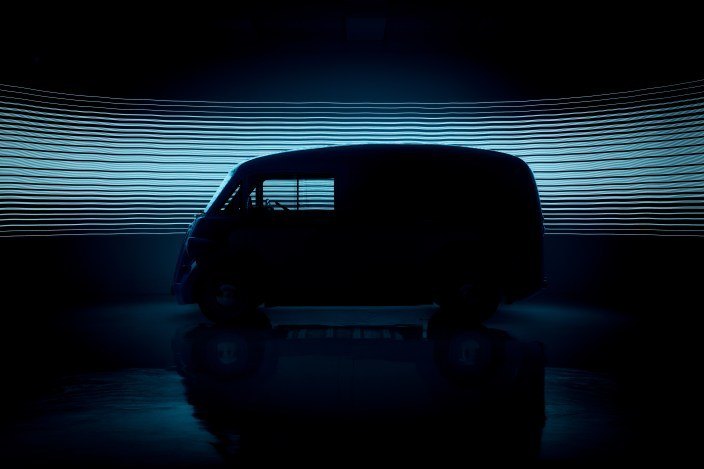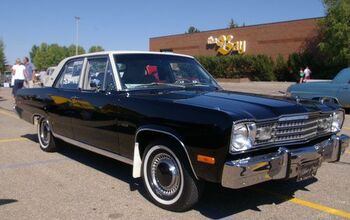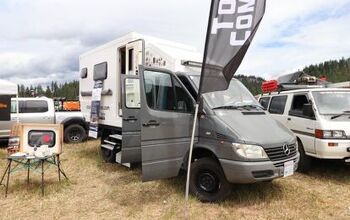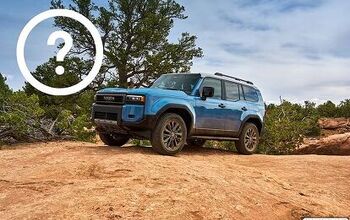New Life for a Long-dead Van?

Startups come and go, and in the age of electrification a great many companies are issuing promises their meagre resources can’t deliver.
Time will tell if a reborn Morris Commercial follows through on a plan to return the iconic J-type commercial van to the rainy streets of Britain — and beyond. Retro appeal has its perks, but getting a new production vehicle, least of all an electric one, off the ground and into garages is fraught with challenges. So, without further introduction, here’s the Morris JE.
Morris Commercial LTD, a UK-based startup that acquired the rights to the defunct British marque not very long ago, plans to build the JE — a spiritual successor to the van seen everywhere in that country in the years and decades following WW2.
Fully electric and boasting a lightweight platform and body born of an “experienced team of established automotive designers and engineers,” Morris Commercial’s JE retains the former model’s profile and “funky” styling. A fully functional prototype is said to be undergoing testing.
“The combination of advanced lightweight chassis with a complete carbon fibre body makes the Morris JE one of the lightest LCVs in the marketplace,” the company stated in a release. “The result is an outstanding power-to-weight efficiency which fully maximises the range of the vehicle.”
Note the liberal use of carbon fiber — a material not often associated with affordable commercial vehicles.
Built from 1949 to 1960, the blunt-faced half-ton J-type excelled in its role, offering voluminous cargo capacity, a compact footprint, and efficiency and affordability in equal measures. A 1.5-liter side-valve four-cylinder provided motivation. The company itself entered the Morris Motors fold in 1924, accompanying it on a journey through BMW and later British Leyland. Morris Commercial ceased to exist as a brand in 1968; its Adderley Park assembly plant closed in 1971, marking the end of the line for the brand’s products.
During its time, Morris Commercial vehicles found their way to 25 countries.
How exactly the new Morris Commercial plans to build, disseminate, and price the JE is unknown at this time. That, and the vehicle’s specs.
“The working engineering prototype has undergone extensive road testing and the end of 2019 is an amazing conclusion to the first phase of the project,” Morris Commercial CEO and founder Dr. Qu Li stated. “We still have a little way to go to bring the project to full production, but we have the team and the product to make this an enormous success. As a business we are committed to environmental sustainability and we are trailblazing a new approach to the production of appealing, fully electric commercial vehicles.”
Dr. Li received much British press a decade ago when her specialty vehicle engineering company, Eco Concept Limited, purchased the assets of fallen UK van manufacturer LDV. She sold the intellectual property rights to Chinese state-owned automaker SAIC Motor Corporation Limited the following year. Li is also the founder and director of business consultancy China Ventures Limited, which owned the now dissolved Eco Concept, and purchased the assets of UK-based Multidrive Limited, a designer and manufacturer of specialty on- and off-road vehicles, in 2007.
What little we know about the vehicle, the company’s suppliers, and Li’s plans for production, coupled with the nature of the fledgling EV market and the list of job vacancies posted by Morris Commercial on August 28th, compel the reader to temper their expectations for an immediate resurrection of the J-type.
[Image: Morris Commercial]

More by Steph Willems
Latest Car Reviews
Read moreLatest Product Reviews
Read moreRecent Comments
- Marcr My wife and I mostly work from home (or use public transit), the kid is grown, and we no longer do road trips of more than 150 miles or so. Our one car mostly gets used for local errands and the occasional airport pickup. The first non-Tesla, non-Mini, non-Fiat, non-Kia/Hyundai, non-GM (I do have my biases) small fun-to-drive hatchback EV with 200+ mile range, instrument display behind the wheel where it belongs and actual knobs for oft-used functions for under $35K will get our money. What we really want is a proper 21st century equivalent of the original Honda Civic. The Volvo EX30 is close and may end up being the compromise choice.
- Mebgardner I test drove a 2023 2.5 Rav4 last year. I passed on it because it was a very noisy interior, and handled poorly on uneven pavement (filled potholes), which Tucson has many. Very little acoustic padding mean you talk loudly above 55 mph. The forums were also talking about how the roof leaks from not properly sealed roof rack holes, and door windows leaking into the lower door interior. I did not stick around to find out if all that was true. No talk about engine troubles though, this is new info to me.
- Dave Holzman '08 Civic (stick) that I bought used 1/31/12 with 35k on the clock. Now at 159k.It runs as nicely as it did when I bought it. I love the feel of the car. The most expensive replacement was the AC compressor, I think, but something to do with the AC that went at 80k and cost $1300 to replace. It's had more stuff replaced than I expected, but not enough to make me want to ditch a car that I truly enjoy driving.
- ToolGuy Let's review: I am a poor unsuccessful loser. Any car company which introduced an EV which I could afford would earn my contempt. Of course I would buy it, but I wouldn't respect them. 😉
- ToolGuy Correct answer is the one that isn't a Honda.



































Comments
Join the conversation
Subscribed . -Nate
Someone should convert a Citroën HY van: https://www.google.com/search?rls=en&q=citroen+hy&tbm=isch&source=univ&client=safari&sa=X&ved=2ahUKEwidnayLyaHlAhVPI6wKHTtbBWAQsAR6BAgGEAE